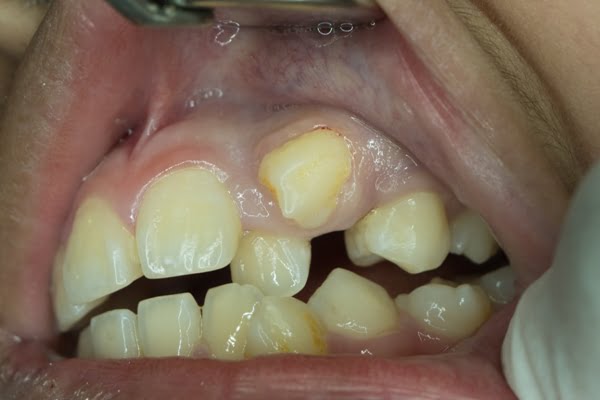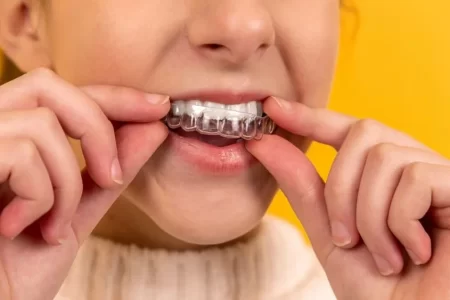Extra Teeth Growing Out of Gums
- Updated on: Jul 23, 2024
- 3 min Read
By
- Published on Dec 20, 2018

Hyperdontia definition: What do extra teeth mean?
Extra teeth or hyperdontia is a state that causes too many teeth to grow in the mouth. These extra teeth are also known as supernumerary teeth. They can grow anywhere in the dental arches (curved areas where teeth attach to the jaw of your mouth) and may affect any dental organ.
There are usually two most important theories about what causes hyperdontia teeth. One of the possible causes of hyperdontia teeth is that an individual tooth bud might divide unusually and may result in double teeth instead of one. Another possible cause that may lead to extra teeth is hyperactivity in dental lamina. Dental lamina is the tissue in our jaws that form tooth buds. Genetics might also play a major role in the development of extra teeth. Read more about causes of extra teeth (supernumerary teeth).
Who is most prone to have extra teeth?
The occurrence of the extra teeth is twice as much common in men compared to women. Various studies have been conducted on the presence of extra baby tooth in children. It was found that the prevalence of extra teeth were higher in boys when compared to girls in a ratio of 6.5 affected boys for every 1 affected girl. It was found that ‘hyperdontia teeth’ is a more common condition in permanent (adult) teeth than baby teeth. Several developmental conditions increase the likelihood of having at least one extra tooth, such as cleft lip or palate and Gardner syndrome, but there’s still research going on to understand what actually causes tooth growing behind another tooth.
How do teeth growing behind teeth affect oral health?
The most noticeable impact of ‘extra teeth growing out of gums’ is on the appearance of the person’s smile. Extra teeth may remain impacted in the gum line and tooth growing out of gum can cause crowding and alignment problems for the normal series of teeth, sometimes making it harder for them to erupt. In serious cases, they can cause root resorption in the adjacent teeth and lead to extra teeth pain.
Supernumerary Teeth Take Several Forms
Extra tooth growing may affect one side of the mouth, both sides of the mouth, or only the front teeth. Extra teeth may grow in between teeth or stuck against teeth in the front or rear of the baby teeth or permanent teeth. These extra teeth may be situated in a way that causes a malfunction of permanent teeth to properly erupt from the jaw. Extra teeth may arise in different ways, including:
- tooth growing in upper gums
- extra teeth growing in gums
- tooth growing out of side of gum
- tooth growing sideways in gum
- tooth growing out of roof of mouth
- tooth growing on top of gum
- tooth growing in roof of mouth
- teeth growing on upper gums
- tooth growing on side of gum
Extra teeth or hyperdontia can develop in various forms, including:
- conical (peg-shaped)
- tuberculate (with multiple cusps)
- supplemental (duplicates of normal teeth)
- odontoma (benign tumor associated with tooth development)
Problems associated with people with extra teeth
Extra teeth not only keep permanent teeth from erupting but may also fuse with them. Problems associated with extra teeth are abscesses, cavities, infections and extra teeth pain. It becomes very difficult brush the teeth effectively due to abnormal growth.
Other oral problems associated with hyperdontia include:
- Movement and displacement of permanent teeth
- Resorption of roots of neighboring teeth
- Increase in tumor and cyst formation
- Irregular facial appearance
- Speech and nutrition problems
Providentially, extra teeth growing in adults or children are usually easy to diagnose and treat. If you schedule a routine dental checkup, your dentist may notice extra teeth in mouth and may look for following dental patterns during their normal examinations, including:
- extra tooth in gum
- extra tooth in roof of mouth
- teeth on top of teeth
- ingrown tooth
- extra baby tooth
- permanent tooth growing over baby tooth
- teeth on roof of mouth
- tooth growing behind another tooth
- permanent tooth growing behind another permanent tooth
- teeth growing behind baby teeth
- extra front tooth
- three sets of teeth
- teeth growing behind teeth
What to do if you notice extra teeth in your children?
Many people with hyperdontia don’t need any treatment. Others may need to have some or all of their extra teeth removed to avoid other dental problems. Read about complications due to extra teeth. Consult your doctor if you feel pain, discomfort or tenderness, swelling, or weakness in your mouth if you have extra teeth.












